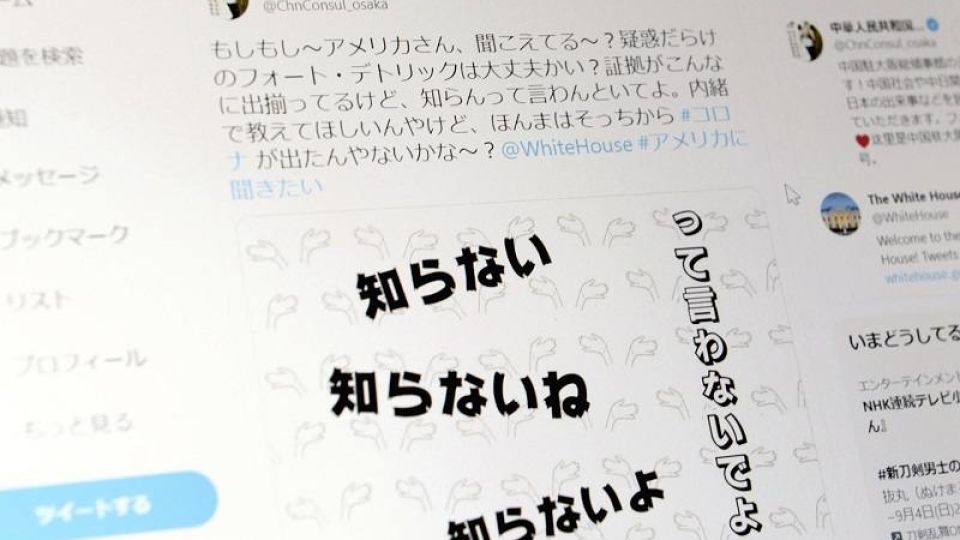September 1, 2022
TOKYO – Several embassies and consulates in Japan have aroused controversy by posting messages espousing one-sided views and using extreme language — and even remarks aimed at Japan — in Japanese on Twitter.
China and Russia have been especially active on this platform to trumpet their own governments’ views and apparently attempt to sway public opinion on a range of issues. Experts are urging readers to take the assertions made in these tweets with a grain of salt.
On Aug. 9, the Chinese Consulate General in Osaka sparked outrage when it posted a quote from an article containing an expert’s predictions for the gross domestic products of Japan, the United States and China for the next 40 years. The quote, suggesting the size of Japan’s GDP would be “like dust” compared to the two other countries in 2060, was criticized as “overly disrespectful,” among other things.
The consulate general stated the words were quoted from a text written by a scholar, and were not the office’s “own expression.” However, the office decided to delete the tweet “to avoid any misunderstanding.”
The consulate general opened its Twitter account in September 2019. Messages posted on this account range from images of adorable pandas and Chinese cuisine to criticism of the United States — which has increasingly been at loggerheads with Beijing — and repeated tweets insisting that economic development is continuing in the Xinjiang Uygur Autonomous Region. There have been allegations of human rights abuses against the Uighur ethnic minority in that region.
On Aug. 6, 2021, the consulate posted a tweet about the origin of the COVID-19 virus. The tweet started by saying, “Hello? **Mr.** America, can you hear me?” and then implied that the virus had actually originated in the United States. The tweet sparked a torrent of criticism. “Is this an official Twitter account?” was one such reaction.
On Feb. 28, four days after Russian forces invaded Ukraine, Russia’s Embassy in Japan posted a tweet saying: “Japan has supported Nazi regimes twice in less than 100 years. Previously, it was the Hitler regime. This time, it is the Ukraine government.”
This tweet was roundly criticized, but the embassy’s account still frequently posts messages expressing Russia’s own views on the situation in Ukraine. On Aug. 23, the embassy tweeted that Ukraine’s government was constantly attacking the Zaporizhzhia nuclear power plant, and an Aug. 21 tweet claimed that Ukrainian forces had used toxic substances against Russian soldiers.
Even the Ukrainian Embassy in Japan has not always been restrained. In March, the embassy urged local governments here to cut sister city relationships with their Russian counterparts, saying that maintaining such ties was “hypocritical.” The embassy later apologized after receiving complaints that the message “went too far.”
53 nations posting in Japanese
The number of embassies and other foreign government entities in Japan posting tweets in Japanese has been rising in recent years. According to a Yomiuri Shimbun survey, at least 53 nations were as of Tuesday posting messages on topics such as grassroots exchanges with Japan, aspects of their own culture, and tourist information. France, Britain and the United States were among the first embassies to set up Japanese accounts in 2009, and Madagascar and Malta were among those joining the club in 2021. The Russian Embassy started tweeting in 2013; China did so in 2014.
Sharing information through overseas diplomatic missions is a part of “public diplomacy,” which aims to directly reach out to the people and shape the opinions of another nation. Ukraine’s extensive use of social media to drum up support from the international community following Russia’s invasion has drawn considerable attention.
However, many nations use the platform to churn out messages unilaterally advocating their own positions. In January 2021, Twitter locked the account of the Chinese Embassy in the United States after it posted a tweet that dehumanized women in the Xinjiang Uygur Autonomous Region.
“Foreign diplomatic missions have, in recent years, become more skillful in their use of Japanese, and they often smoothly explain their own nation’s policies and culture,” said Hosei University Prof. Hiroyuki Fujishiro, an expert on social media. “But in saying that, in some instances, they aim to cause a stir or attract attention to a certain point they want to get across. Both approaches are part of a state’s information strategy. Twitter users need to take a step back before they accept all the content these missions post.”
Japan also gets word out
Japan’s overseas diplomatic missions also share information online in English and other languages spoken in those nations.
According to the Foreign Ministry, Japanese missions in 50 nations had set up Twitter accounts as of July. In addition to providing updates on daily activities such as events with local government officials to discuss and expand business opportunities, these missions introduce Japanese traditional events, food and manga.
The ministry has set guidelines covering content that these missions can post on social media. If any post “defames, or harms trust in or the prestige of a specific individual, company, organization or other entity” or “is false or significantly removed from the truth,” the ministry will take responsibility and deal with the matter.
“Social media is an important tool for boosting understanding of and affection for Japan,” a ministry representative said. “We will carefully examine the trends in international public opinion and convey our nation’s positions to the world.”

